|

SLOW GROWTH
The year 2015-2016 was a flat year for the UPS industry. Some companies
grew while others failed to do so. The industry netted revenues to the
tune of INR 5121.74 crore. This is exclusively the end-user sales
figure. However the over all industry revenue was estimated at INR
5375.00 crore approx. The reason why the total industry revenue is much
higher then the actual end-user sales is because many a companies
procure finished products from others & brand them as theirs, and our
survey team gets the turnover from both, resulting in duplication. With
nearly 342 companies responding to our survey, giving us the information
we sought in great detail, knowing fully well how much the company has
man-ufactured with excise paid. And also trying to find out, which
companies procure finished products from others & brand them as
theirs,
an exercise which We have been doing only since last seven years, we did
all of it again to give continuity to the process.
Out of 342 companies responding only 181 companies were
awarded
with SD Ratings.
However most of companies are facing it with ease to match quarter to
quarter sales of 15-16 in 16-17. We are sure the figure which we have
arrived at i.e. the actual end-user sales revenue of has definitely
crossed INR 5375.00 crore mark in the current fiscal.
Growth wise it has been a mixed year with some of the majors growing
while others dipping.
Revenue-wise : This year 2015-16, the industry grew by 6.3%
&
revenues grew up to 5121.74 crores, a clear indicator that less than 5%
growth in last two years is over and even fiscal (2016-2017) the growth
will be over 6.5% for sure.
Volume-wise : Industry grew by 18.6% over previous year in
volume
terms. This clearly indicates shrinking margins. Drops in revenues while
increase in volume.
One must be clear in mind that this is a very good performance
considering the stiff competition and the squeezed margins in view of
hammering the companies got during the global economic meltdown &
currently facing Indian Rupee slide and a strong dollar value.
Of the total revenue of 5121.74 crores, Online UPSs accounted for 91%
while Offline / Line interactive UPSs accounted for nearly 3% while
other products including Services & change of batteries accounting for
the rest. We have not included the Home UPS sales figure in this
analysis .
Of the total revenue organized sector accounted for nearly 76% while 24%
came through semi organized and unorganized sector.
SD FINDINGS
Softdisk went about finding the state of the industry and also how deep
they were actually effected by recession, The first two quarters of the
financial year 2016-17 were better than last year. Projects have been
few but the demands continue, in the current fiscal no major projects
came up baring a few. Banks have now after two quarter started their
purchases it is only in September that the things started moving. The
overall effect is putting expansion plans on hold. They have given more
stress on best utilization of their existing facility and
infrastructure. Growth for big IT, ITES & TELCOM segment even during
recessionary trend continued its positive trend for tower
infrastructure. This has kept mid segment market for UPS going well
(up-to 200KVA). A small power data center with power requirement of 20,
60, 200KVA rating are also going as per plans. The Industrial market
segment covering Power, Energy, Manufacturing, Steel, Cement, Oil &
Gas,
always experienced steady and normal growth of 10-12%. The same is
continuing in this year. Softdisk believes that more and more people are
moving towards Solar. Solar PCU units are the new mantra for the UPS
Companies, some have even manufactured and installed Grid Tied Solar
UPS, with hybrid charge facility (Photovoltaic & Mains).
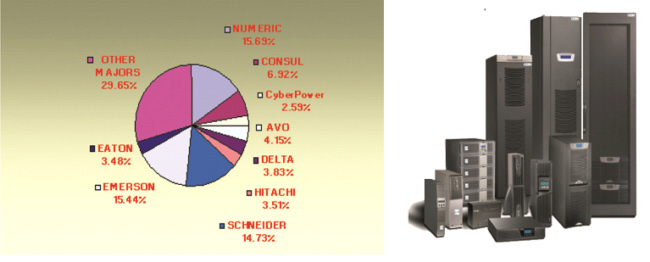
With consolidation being the mantra for Industry. One can say the
entire
Online UPS market can be divided into following APC-Schneider, Eaton,
Numeric, Consul, Uniline, Delta, CyberPower, Hitachi, Other Major
players Switching AVO, Socomec, Power One, Techser & Hykon &
the rest.
Talking of market share Numeric has the highest market share of 15.95%
followed closely by Emerson 15.70%, APC 14.97%, Consul 7.03%, AVO
4.15%,
Delta 3.89%, Eaton 3.54% & so on as shown in graph above. While
other
major players account for rest. However Emerson Network Power has now
been acquired by Platinum Associates of USA & will operate under a
new
name from January 2017.
SD ESTIMATES
Softdisk had predicted in August 2015 that the total industry revenue
will cross INR 5500 crore mark by March, 2016. We talked to Industry
Captains trying to know what the Industry leaders thought. Many had
little or no doubt to what Softdisk has predicted earlier, even though
this response was at time when the global economies were trying to come
out of worst ever economic crises, and Indian market was also shaken by
it. As on date we feel that nearing 5121 crore mark for end-user sales
and 5375 crore mark including secondary sales was quiet a close
prediction. Softdisk remains committed to transparent reporting,
in-depth analysis and always throwing up forecast & estimates which
you
can Rely Upon.
We have Faith, You
Rely on
us, We Rely on facts. |
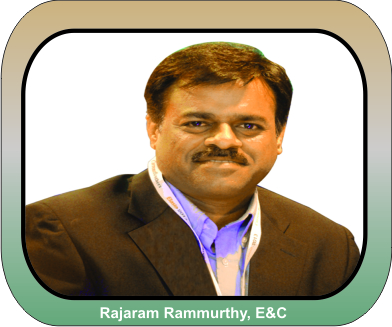 According
to Mr. Rajaram Rammurthy, MD E&C With the government opening up
markets
for FDI and making the environment more conducive for foreign players to
conduct business in India, consolidation is imminent and the only way to
go and better for Indian manufacturers to exit. Price war among the
players in the industry coupled up with unfair customer buying
practices, erosion in the supply chain wherein viable suppliers getting
marginalized, consolidation for achieving economies of scale will
happen. Price being the foremost parameter for purchase, technology is
taking a backseat as far as purchases are made. According
to Mr. Rajaram Rammurthy, MD E&C With the government opening up
markets
for FDI and making the environment more conducive for foreign players to
conduct business in India, consolidation is imminent and the only way to
go and better for Indian manufacturers to exit. Price war among the
players in the industry coupled up with unfair customer buying
practices, erosion in the supply chain wherein viable suppliers getting
marginalized, consolidation for achieving economies of scale will
happen. Price being the foremost parameter for purchase, technology is
taking a backseat as far as purchases are made.China as a country is
a global hub for most products (of even MNC brands) that one can imagine
today. With several foreign brands getting their products made in China
for global distribution, China is and will continue to be the leader in
manufacturing volumes and prices. Moreover, China being such a huge
manufacturing hub, the electronics components are available to them at
very low prices and their manufacturing ecosystem is excellent. India
and the average Indian manufacturer with the resources available to them
will find it very difficult to match Chinese prices in the mass market
products.
With the âMake in Indiaâ initiative under way, more foreign companies
have entered India. The strategy of many of these companies is to
manufacture locally in India, but still supply at Chinese prices to
capture the market. With the average Indian psyche that believes in
foreign brands, and even several Government departments favouring
foreign brands, the market is all wide open for foreign brands and
companies to invade leading to disadvantages for Indian brands and
manufacturers to survive.
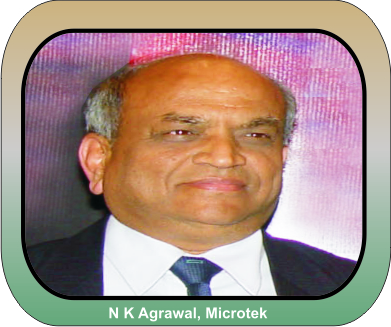 He further adds Indian UPS Industry
is no doubt growing. The competition
is very fierce and there is price war. Market is very fragmented and the
Industry associations are not very effective in streamlining the
industry or the customerâs buying procedures. Customers are getting more
brand agnostic and focussing more on prices. Government orders have a
high procurement costs which is very unfortunate. Payments are hard to
come by. With the foreign players coming into business, dealer segments
and channels are becoming a bigger challenge for the Indian UPS
Manufacturers. He further adds Indian UPS Industry
is no doubt growing. The competition
is very fierce and there is price war. Market is very fragmented and the
Industry associations are not very effective in streamlining the
industry or the customerâs buying procedures. Customers are getting more
brand agnostic and focussing more on prices. Government orders have a
high procurement costs which is very unfortunate. Payments are hard to
come by. With the foreign players coming into business, dealer segments
and channels are becoming a bigger challenge for the Indian UPS
Manufacturers.
Talking
on the subject of slowdown in the market Mr. N K Agrawal of Delhi based
Microtek laments that in 2015-16 market has been slowed down and was
not
buoyant. This financial year the economy world over is moving under the
shadow of fear of major recession in US and Europe, also the Chinese
depreciation of their currency has made the market slowdown further, it
will not impact Indian markets but spillover effect is showing its
signs, the falling rupee is one such sign. In-spite of all this we still
feel that the UPS Segment will show a growth in this year also all
though low. We have to give some time to the new govt at the center
which is trying its best to bring back the economy back on track. (Here
it is worth mentioning that Softdisk figure does not include the revenue
generated by Inverters, which too is effected by the slow down.) As
regards to our expansion we will be coming up with complete range of
Solar products he adds.
 According
to Mr. Deepak Singh Thakur, Director Delta follows the concept of
economy of scale ensuring right product and right quality. Delta also
has its local manufacturing unit at Rudrapur and Gurgaon. Delta Power
Solutionâs manufacturing plant at Rudrapur, India (first Green
manufacturing facility in India) has a capacity of manufacturing UPS up
to 4000 kVA along with battery banks, harmonics filters, accessories and
allied products to provide an end to end power backup solution. UPS
assembly line is equipped with latest equipments and fully automated
test stations to perform full range of parametric test for ratings up to
500 kVA (largest rating as single module), Environment chamber to
perform UPS burn- in test at elevated temperature, Variable voltage and
frequency source for testing UPS as per practical site conditions and
simulating worst case utility conditions, Pure resistive as well as
variable power factor load to perform UPS full load test for practically
all conditions and get rid of any infancy failure in UPS. According
to Mr. Deepak Singh Thakur, Director Delta follows the concept of
economy of scale ensuring right product and right quality. Delta also
has its local manufacturing unit at Rudrapur and Gurgaon. Delta Power
Solutionâs manufacturing plant at Rudrapur, India (first Green
manufacturing facility in India) has a capacity of manufacturing UPS up
to 4000 kVA along with battery banks, harmonics filters, accessories and
allied products to provide an end to end power backup solution. UPS
assembly line is equipped with latest equipments and fully automated
test stations to perform full range of parametric test for ratings up to
500 kVA (largest rating as single module), Environment chamber to
perform UPS burn- in test at elevated temperature, Variable voltage and
frequency source for testing UPS as per practical site conditions and
simulating worst case utility conditions, Pure resistive as well as
variable power factor load to perform UPS full load test for practically
all conditions and get rid of any infancy failure in UPS.
In addition to providing technologically superior, quality products that
meets the global standards, Delta Power Solutions local manufacturing at
helps meet another dimension of business needs today - On time and short
delivery times. Current day business needs require that projects are
completed on time as projects overruns lead to an unprecedented
opportunity loss in Telecom, IT setups, Data Centers, Medical
establishments and Industry at large.
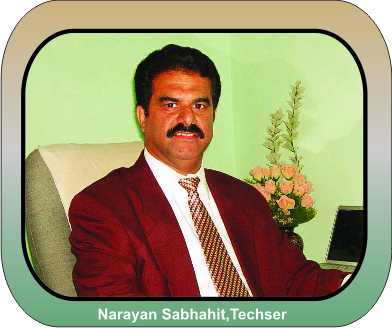 According
to Mr. Narayan Sabhahit Managing Director, Techser Power Solutions Pvt.
Ltd, Bangalore, believes that after the tough financial year of 2014-15,
2015-2016 was very challenging year due to high volatility in the market
and fierce competition for top-line pie. Techser consciously decided to
avoid any 'cut-throat' competition paradigm. We diligently decided that
it is better to work on healthy orders rather that 'vanity orders' which
could only boost top-line but adversely affecting bottom-line. The year
also has been a year of consolidation with respect to our restructuring
manufacturing and services offerings. We tried to strengthen our work
force wherever required which enabled us to bounce back in to the market
more strongly. What made us feel better was having a stable government
at the centre will aided in better confidence for foreign companies to
invest in India. India has been an attractive destination for long for
several foreign companies, but the major problem has been the red tape
in conducting business as the laws of the land have been inherently
quite ambiguous even for Indian Companies and entrepreneurs. In this
regard introduction of BIS registration for up to 5 k.Va of UPSâs being
made Mandatory is welcome sign. The Objective in particular is correct
that products meet certain safety standards. However, the formulation of
the process could have been better. They should have been more specific.
I feel that the important line of products that need to be certified for
Safety are the equipments used for homes. They are mainly off the shelf
products which conform to a certain configuration. According
to Mr. Narayan Sabhahit Managing Director, Techser Power Solutions Pvt.
Ltd, Bangalore, believes that after the tough financial year of 2014-15,
2015-2016 was very challenging year due to high volatility in the market
and fierce competition for top-line pie. Techser consciously decided to
avoid any 'cut-throat' competition paradigm. We diligently decided that
it is better to work on healthy orders rather that 'vanity orders' which
could only boost top-line but adversely affecting bottom-line. The year
also has been a year of consolidation with respect to our restructuring
manufacturing and services offerings. We tried to strengthen our work
force wherever required which enabled us to bounce back in to the market
more strongly. What made us feel better was having a stable government
at the centre will aided in better confidence for foreign companies to
invest in India. India has been an attractive destination for long for
several foreign companies, but the major problem has been the red tape
in conducting business as the laws of the land have been inherently
quite ambiguous even for Indian Companies and entrepreneurs. In this
regard introduction of BIS registration for up to 5 k.Va of UPSâs being
made Mandatory is welcome sign. The Objective in particular is correct
that products meet certain safety standards. However, the formulation of
the process could have been better. They should have been more specific.
I feel that the important line of products that need to be certified for
Safety are the equipments used for homes. They are mainly off the shelf
products which conform to a certain configuration.
Online UPS are used for specific commercial purposes in a supervised
environment compared to a home UPS / Inverter. Hence they are not
standard off-the-shelf products in the Indian context. Every customer
has a different specification requirement and hence it also qualifies as
a custom product / solution. Under such circumstances, the product that
is built may have a different DC Bus, Charging requirements, Input /
Output Sockets, Display requirements, Redundancy requirements etc. It is
not practical to get every configuration to be tested and certified
considering the high certification and registration costs. Hence, based
on the above premise, the Online UPS should not have been included in
the mandatory certification / registration requirement, or the
guidelines should have been made with certain exceptions. Having said
the above, it should not be construed that products can be made and
supplied of poor quality. It is certainly a big task for most
manufacturers and costs time and money to get certified and registered
for meeting the mandatory requirement.
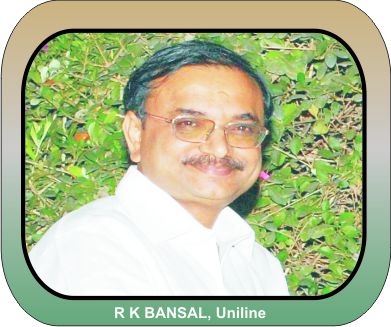 According
to Mr. R K Bansal Managing Director Uniline Energy Systems Pvt. Ltd.
elaborated on this issue, according to him when we speak about market,
we have an enterprise market segment in mind. Most of the top notch UPS
companies like APC, Eaton, Numeric etc to some extent mostly serve this
business segment. Our strength lies in Govt. sector & PSUs. As per our
understanding, the market segment revenue (excluding precision A/C,
Electrical distribution, etc.) for UPS Systems is close to INR 4000 Cr.
Looking at the present market scenario, the revenue collection from this
segment shall be within INR 3500 to 5000 Crore in the current fiscal
this year. We had a tough time this year with revenue falling by over
30% in 2014-15, however we able to arrest this trend as the dip was
merely 1% in 2015-16, all though many companies have done well but
general tendency is of slump. The expansion plans are put on hold by
most of the big names in IT, ITES. Even the aggressive companies in IT
infrastructure segment are no exception. There is more emphasis on best
utilization of existing IT facilities and also human resource. Even the
Data Centers projects in telecom segment with few exceptions are either
postponed or put on temporary hold. Governments buying has also gone
down as many a governments projects have been put on hold. In BIS
requirement the awareness and understanding is missing among several
UPS
manufacturers and several smaller players are not aware of such
requirements. In addition, the home usersâ awareness that only BIS
certified / registered products should be bought is also low. The
business of small players and âfly by nightâ competition will continue
to be the same in the unorganized segment, which has been a good market
for the small players. BIS registration is not going to have any impact
on the price of products as long as price is the major deciding factor
of a customer making the purchase. This will not change in the
foreseeable future. The challenges for the organized players in the
organized segment is expected to remain the same â price, supply and
service. According
to Mr. R K Bansal Managing Director Uniline Energy Systems Pvt. Ltd.
elaborated on this issue, according to him when we speak about market,
we have an enterprise market segment in mind. Most of the top notch UPS
companies like APC, Eaton, Numeric etc to some extent mostly serve this
business segment. Our strength lies in Govt. sector & PSUs. As per our
understanding, the market segment revenue (excluding precision A/C,
Electrical distribution, etc.) for UPS Systems is close to INR 4000 Cr.
Looking at the present market scenario, the revenue collection from this
segment shall be within INR 3500 to 5000 Crore in the current fiscal
this year. We had a tough time this year with revenue falling by over
30% in 2014-15, however we able to arrest this trend as the dip was
merely 1% in 2015-16, all though many companies have done well but
general tendency is of slump. The expansion plans are put on hold by
most of the big names in IT, ITES. Even the aggressive companies in IT
infrastructure segment are no exception. There is more emphasis on best
utilization of existing IT facilities and also human resource. Even the
Data Centers projects in telecom segment with few exceptions are either
postponed or put on temporary hold. Governments buying has also gone
down as many a governments projects have been put on hold. In BIS
requirement the awareness and understanding is missing among several
UPS
manufacturers and several smaller players are not aware of such
requirements. In addition, the home usersâ awareness that only BIS
certified / registered products should be bought is also low. The
business of small players and âfly by nightâ competition will continue
to be the same in the unorganized segment, which has been a good market
for the small players. BIS registration is not going to have any impact
on the price of products as long as price is the major deciding factor
of a customer making the purchase. This will not change in the
foreseeable future. The challenges for the organized players in the
organized segment is expected to remain the same â price, supply and
service.
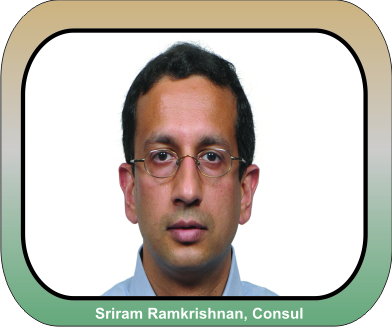 On
the question of BIS Mr. Sriram Ramakrishnan, MD, Consul says Mandatory
BIS implementation for UPS upto 5kva is a step in the right direction.
It will benefit the customers who currently face a challenging situation
in evaluating an UPS and were getting disillusioned with the products
available in the market, thereby affecting the image of the UPS
manufacturers in India. The move towards mandatory BIS for UPS upto
5kva
has cleared up a lot of air by bringing in standards for the product. It
has reduced but not totally eliminated the so called âfly by nightâ
operators, that can only be achieved through a program to educate
customers as a lot of customers adopt a price first stance for
evaluating and buying a UPS. BIS standards implementation will not
necessarily lead to increase in profitability due to reduction in number
of competitors. This is a very simplistic view of the scenario, in
reality the situation is more complex, customers are today looking at
ways to cut costs especially corporate. There is a relentless move to
drive costs down, internal dynamics of companies in the UPS
manufacturing segment make some of them reduce costs to unviable
levels.
This results in a burnt earth policy that results in buyers pushing
other UPS manufacturers to follow suit. On
the question of BIS Mr. Sriram Ramakrishnan, MD, Consul says Mandatory
BIS implementation for UPS upto 5kva is a step in the right direction.
It will benefit the customers who currently face a challenging situation
in evaluating an UPS and were getting disillusioned with the products
available in the market, thereby affecting the image of the UPS
manufacturers in India. The move towards mandatory BIS for UPS upto
5kva
has cleared up a lot of air by bringing in standards for the product. It
has reduced but not totally eliminated the so called âfly by nightâ
operators, that can only be achieved through a program to educate
customers as a lot of customers adopt a price first stance for
evaluating and buying a UPS. BIS standards implementation will not
necessarily lead to increase in profitability due to reduction in number
of competitors. This is a very simplistic view of the scenario, in
reality the situation is more complex, customers are today looking at
ways to cut costs especially corporate. There is a relentless move to
drive costs down, internal dynamics of companies in the UPS
manufacturing segment make some of them reduce costs to unviable
levels.
This results in a burnt earth policy that results in buyers pushing
other UPS manufacturers to follow suit.
Price is the key in a commodity market. A UPS is not a commodity
especially for the larger 3 phase or Enterprise Class UPS. The Chinese
effect is strong in the small single phase UPS and lower capacity three
phase segment as the domestic manufacturers were caught on the wrong
foot with old technology and high prices. In this segment it will be a
challenge to match the Chinese players on price keeping in mind the
infrastructure and manufacturing scale that they have built. With no
differentiation in technology and features, single phase and smaller
three phase UPS has become a commodity product with low margins. The
enterprise class UPS segment is at the other end and dominated by
European and American MNCâs. Growth of the Indian UPS industry has been
anemic for the last two years. This has forced many UPS players to
diversify. But with now signs of economic growth, we look forward to
atleast strong single digit growth this year and next, he laments.
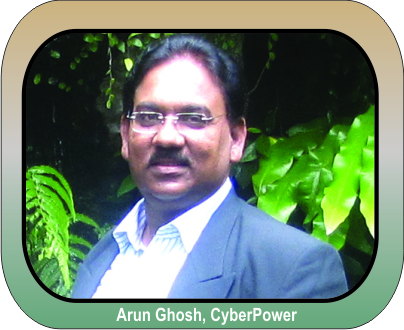 On
the other hand Mr. Arun Ghosh, MD, CyberPower India is of the view that
Implementing BIS up to 5 kVA of UPSâs is being made Mandatory, it is
good for Branded / Manufacturing Companies. As a growing market, India
is our main focus of attention. The main advantage is we have our own
manufacturing plant with our own separate design, R&D and
implementation
teams. If there is a demand for a new design, we can get that ready
within speculated time. These factors place us a notch above the rest in
the market. A major challenge faced by Indian UPS market is the import
of cheaper systems, local brand with poor quality products, competition
from unorganized sectors, fluctuating commodity prices etc. But due to
BIS implementation made mandatory, the companies have become
organized
and aggressively pushing their products at a reasonable price and with
advance technology. As a result, small companies and âfly by nightâ
operators will be unable to cope up with this situation and will lose
ground. He also feels that introduction of BIS registration for higher
kVA of UPS's to be made Mandatory should be welcomed. This will help to
rationalize the quality of products and stop the mushrooming imports. He
also believes that the upward trend in the Indian market is expected to
continue, with consistent growth projected over the coming 2-3 years as
a result of steady demand from various end user sectors. On
the other hand Mr. Arun Ghosh, MD, CyberPower India is of the view that
Implementing BIS up to 5 kVA of UPSâs is being made Mandatory, it is
good for Branded / Manufacturing Companies. As a growing market, India
is our main focus of attention. The main advantage is we have our own
manufacturing plant with our own separate design, R&D and
implementation
teams. If there is a demand for a new design, we can get that ready
within speculated time. These factors place us a notch above the rest in
the market. A major challenge faced by Indian UPS market is the import
of cheaper systems, local brand with poor quality products, competition
from unorganized sectors, fluctuating commodity prices etc. But due to
BIS implementation made mandatory, the companies have become
organized
and aggressively pushing their products at a reasonable price and with
advance technology. As a result, small companies and âfly by nightâ
operators will be unable to cope up with this situation and will lose
ground. He also feels that introduction of BIS registration for higher
kVA of UPS's to be made Mandatory should be welcomed. This will help to
rationalize the quality of products and stop the mushrooming imports. He
also believes that the upward trend in the Indian market is expected to
continue, with consistent growth projected over the coming 2-3 years as
a result of steady demand from various end user sectors.
 As
per Mr. Christo George, Chairman & MD, implementation of BIS
registration for up to 5 KVA of UPSâs is made Mandatory is a good
decision. This will ensure the safety and quality of products. This
decision also helps the customers to determine the quality. BIS standard
in general will be good not only for the end customers but also for the
industry suppliers as this will help genuine players / manufacturers to
be in the market for a longer period. The market for inverters and UPS
in India is fragmented and there exist a large number of small
unorganized players manufacturing sub-standard and local products. The
presence of these large numbers of unorganized suppliers with lower
priced product offerings has resulted in stiff competition in the
domestic/SOHO segments, especially in the less-than-1 kVA and 1-5 kVA
segments. By implementing BIS certification the small players who offer
cheap rates with low quality will be thrown out from the market. As
per Mr. Christo George, Chairman & MD, implementation of BIS
registration for up to 5 KVA of UPSâs is made Mandatory is a good
decision. This will ensure the safety and quality of products. This
decision also helps the customers to determine the quality. BIS standard
in general will be good not only for the end customers but also for the
industry suppliers as this will help genuine players / manufacturers to
be in the market for a longer period. The market for inverters and UPS
in India is fragmented and there exist a large number of small
unorganized players manufacturing sub-standard and local products. The
presence of these large numbers of unorganized suppliers with lower
priced product offerings has resulted in stiff competition in the
domestic/SOHO segments, especially in the less-than-1 kVA and 1-5 kVA
segments. By implementing BIS certification the small players who offer
cheap rates with low quality will be thrown out from the market.
However he believes that unorganized suppliers are not playing much in
the higher capacity segment. So it is not a must to implement BIS for
higher KVA UPS. Generally the higher capacity UPS requirements are
mostly custom made and the supplies will be based on the quality and
subsequent testing. This is not the case with smaller capacity UPS.
Hence BIS need not be mandatory for higher capacity UPS.
The major challenges that UPS manufacturers face are the low-cost
imports from China and Taiwan, as well as increasing raw-material
prices. As end users have specific applications and different
requirements, it is important for suppliers to offer customized
solutions to survive and sustain high growth in this fiercely
competitive market. Cheap imports from China and Taiwan, paralleled by
mounting raw material prices, will pose significant challenges to Indian
UPS manufacturers. The increase in battery prices, coupled with rising
manpower costs, has resulted in UPS suppliers struggling to maintain
their margins. Different end users of UPS have specific applications
and, hence, they expect product customization to suit their
requirements. It will be important for suppliers, therefore, to offer
customized solutions to end-user groups. This will help them survive and
sustain higher growth rates in this fiercely competitive market. He also
feels by applying BIS standards the number of competitors will
definitely come down. However we feel that it might not give an increase
in profitability he laments.
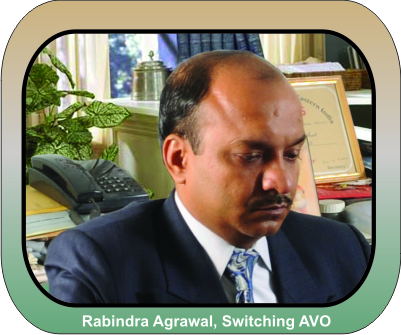 According
to Mr. Rabindra Agrawal, MD Switching Avo as most of the components of
UPS are importing, the cost of UPS will go up due to the increased
Dollar rates. It is good in one sense for Indian UPS manufacturers as
the cost of finished UPS from China will be increased further. So time
has reached for the Indian manufacturers to mass produce the UPS below
5kVA instead of depending on the China Import. But at the same time
reverse auction is killing all & sundry. The only way customers can be
spoken out of is by explaining the demerits of Reverse Auction and
making them understand. (1) In some tenders, customer is procuring at
prices which are higher than what they would otherwise procure in closed
tenders. (2) Customers are getting supplies which are compromised in
terms of specifications which they are unaware. On the Supplierâs side,
(a) the reverse auctions are just too time consuming, sometimes the
process takes almost a full day, (b) too much dependence on
network/internet connectivity and infrastructure issues (c) Customers
themselves setting unrealistic starting bid prices. According
to Mr. Rabindra Agrawal, MD Switching Avo as most of the components of
UPS are importing, the cost of UPS will go up due to the increased
Dollar rates. It is good in one sense for Indian UPS manufacturers as
the cost of finished UPS from China will be increased further. So time
has reached for the Indian manufacturers to mass produce the UPS below
5kVA instead of depending on the China Import. But at the same time
reverse auction is killing all & sundry. The only way customers can be
spoken out of is by explaining the demerits of Reverse Auction and
making them understand. (1) In some tenders, customer is procuring at
prices which are higher than what they would otherwise procure in closed
tenders. (2) Customers are getting supplies which are compromised in
terms of specifications which they are unaware. On the Supplierâs side,
(a) the reverse auctions are just too time consuming, sometimes the
process takes almost a full day, (b) too much dependence on
network/internet connectivity and infrastructure issues (c) Customers
themselves setting unrealistic starting bid prices.
BIS certification is a welcome initiative by the government. This will
ensure that all goods are safe to be used by the the end users. However
lack of testing centres / facilities coupled with vast inventory vide
importing by thousand of Indian vendors will make it extremely difficult
for importer to get a BIS certificate timely. However he does not think
so that BIS certification will throw out small players. Yes, may be fly
by night operators will be thrown out. I feel even if small time
manufacturer, if they have a good system with satisfactory procedures,
BIS certificate will be a blessing and eventually the BIS can be a big
tool to improve the small/medium manufacturer.
He adds service & support are our forte. Third Party Servicing /
Maintenance is a concept that is emerging since the last few years. Big
Customers adopt this concept to ensure single point of contact for
maintenance to ensure that they concentrate on their core competency. It
is a good option, as long all UPS are serviceable by anybody. Web have
taken this to a new level, by introducing App oriented services. Several
big service companies are adopting this and the concept is catching up.
This is mainly because of poor understanding and trivializing the
important issue. Most organizations are becoming too sensitive to costs
and are taking hasty decisions to award support to third parties he
laments.
 According
to Mr. K V Nachiappan, Director, Numeric, today Indian power
conditioning market is getting more sensitive and mature to the evolving
needs of the businesses. With India assuming a key role in the Asian
economy, businesses have become attuned to the fact that they need to be
robust in terms of infrastructure to attract and retain investors.
Hence, Business Critical Continuity is being viewed strategically and
upcoming businesses are realizing the importance of factoring and
aligning it as key component in the overall business model. Adding
further they say we view the present market scenario as an opportunity
to strengthen our companyâs presence in Industrial market segment.
Extremely low prices are unsustainable if quality/service levels are to
be maintained. Price erosion beyond a point hurts all stake holders â
manufacturers, channel partners, customers, etc. If it continues beyond
a point it will lead to disastrous consequences for vendors. We have
taken a wise decision not to take up orders were we have to cut down on
margins this has lead to increased profitability where we are successful
to a great extent and the results are showing but top line takes the
hit. According
to Mr. K V Nachiappan, Director, Numeric, today Indian power
conditioning market is getting more sensitive and mature to the evolving
needs of the businesses. With India assuming a key role in the Asian
economy, businesses have become attuned to the fact that they need to be
robust in terms of infrastructure to attract and retain investors.
Hence, Business Critical Continuity is being viewed strategically and
upcoming businesses are realizing the importance of factoring and
aligning it as key component in the overall business model. Adding
further they say we view the present market scenario as an opportunity
to strengthen our companyâs presence in Industrial market segment.
Extremely low prices are unsustainable if quality/service levels are to
be maintained. Price erosion beyond a point hurts all stake holders â
manufacturers, channel partners, customers, etc. If it continues beyond
a point it will lead to disastrous consequences for vendors. We have
taken a wise decision not to take up orders were we have to cut down on
margins this has lead to increased profitability where we are successful
to a great extent and the results are showing but top line takes the
hit.
Softdisk believes that UPS manufacturers
are supplying and installing a
POWER CONDITIONING product, A CAPITAL EQUIPMENT and not a box
pushing
activity. In the absence of a detailed technical selling based on
performance, reverse auction becomes a simple number game for everyone.
This will lead to killing the very industry practice itself and the
customers will realize this after few years later. If this is for
computer stationery (or) purchase of tube lights etc then the reverse
auction is Ok as most competitive bidder will sell more.
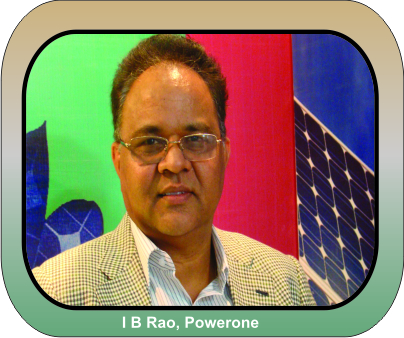 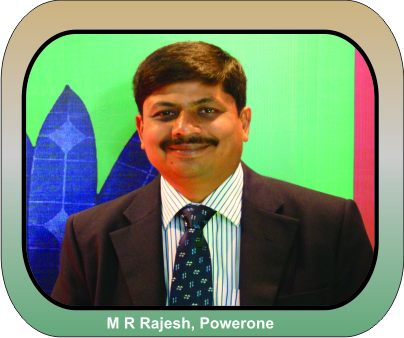 According
to Mr. I B Rao & Mr. M R Rajesh of Power One Micro Systems Pvt. Ltd.
opines that Softdisk has a scientific approach towards market analysis,
for its volume and revenue of the UPS Market (UPS + Batteries and
service sales). According
to Mr. I B Rao & Mr. M R Rajesh of Power One Micro Systems Pvt. Ltd.
opines that Softdisk has a scientific approach towards market analysis,
for its volume and revenue of the UPS Market (UPS + Batteries and
service sales).
By 2015-16, UPS sales may touch the 5200 Crore mark subject to
considerable recovery in IT business segment. With India assuming a key
role in Asia, businesses have become attuned to the fact that they need
robust power continuity support infrastructure to attract and retain
investors. Having mentioned a Robust system, the BIS Compulsory
Registration Scheme for Safety is a healthy initiative to provide safety
and quality for UPS particularly for Line interactive range.
The entire industry should join together to cooperate towards a healthy
price bid and avoid reverse auction which creates an unfair evaluation,
especially reverse auction of After Sales Services. Most reverse
auctions are based only on price without considering financial,
technical, service capability and product reliability of the
organization should not be encouraged. Further, such a practice will
only reduce and weaken the already stagnant market.
The UPS being a technical solution which provides a lifeline for todayâs
business requirements and financial transactions should not be treated
as a commodity sale. But rather, as a technical offer which provides
âPower Continuity Solutionsâ and must be given its due respect.
 According
Mr. Shankar Nagali, Cosmic Micro Systems, now a days we see service
tenders being floated separately many a companies import low quality
products, install and maintain it for three year and leave the scene
giving rise to such service tenders being floated. He was very vocal on
the subject of third party maintenance that it is common knowledge that,
though UPS being a proven technological concept, differs in its
construction based on manufacturer. Components for spares sometimes
become inaccessible leading to servicing difficulties resulting in
replacement of a UPS with another equivalent product. This method proves
costly for the maintenance vendor and the customer loses the original
asset quality which is not clearly visible during the life of the
maintenance contract. This is a perceived loss to the customer. UPS OEMs
on the other hand lose their valuable service revenue which was hitherto
their assured income. This unhealthy practice is being practiced by most
UPS OEMs, and as a matter of safeguarding their own interests and
incomes. Refraining others from taking maintenance of other makes is
difficult to implement, as there are numerous unorganized players.
Customers should also verify the claims of a third party service company
about their capability to service of other makes as the absence of that
could lead to a huge loss to them in the form of degraded product /
performance and damage the operational efficiency of their organization
leading to fresh purchase. Such OEMs not realize that such practice not
only defame their company but also whole industry. According
Mr. Shankar Nagali, Cosmic Micro Systems, now a days we see service
tenders being floated separately many a companies import low quality
products, install and maintain it for three year and leave the scene
giving rise to such service tenders being floated. He was very vocal on
the subject of third party maintenance that it is common knowledge that,
though UPS being a proven technological concept, differs in its
construction based on manufacturer. Components for spares sometimes
become inaccessible leading to servicing difficulties resulting in
replacement of a UPS with another equivalent product. This method proves
costly for the maintenance vendor and the customer loses the original
asset quality which is not clearly visible during the life of the
maintenance contract. This is a perceived loss to the customer. UPS OEMs
on the other hand lose their valuable service revenue which was hitherto
their assured income. This unhealthy practice is being practiced by most
UPS OEMs, and as a matter of safeguarding their own interests and
incomes. Refraining others from taking maintenance of other makes is
difficult to implement, as there are numerous unorganized players.
Customers should also verify the claims of a third party service company
about their capability to service of other makes as the absence of that
could lead to a huge loss to them in the form of degraded product /
performance and damage the operational efficiency of their organization
leading to fresh purchase. Such OEMs not realize that such practice not
only defame their company but also whole industry.
Different views were expressed on taxation front. Where one segment
believes that UPS imports should be exempted for taxes the segment talks
of protecting the interest of Indian UPS Manufactures. According to Mr.
Vinod Kumar of Arvi Systems & Controls Pvt. Ltd., Bangalore believes
Govt. should considering the importance of UPS systems in a growing
economy and keeping in view the power Scenario what it is, the Govt.
should certainly exempt all UPS systems from import duties, Customs
Duties, excise duties etc. Although âThe government is quite
 conscious
of the power scenario in the country, yet it seems that all the new
addition to the installed capacity do not gives us the comfort of
continuous power even by the year 2020. Despite this grave situation,
there are no special incentives or support for the UPS installation
except in a very limited way. Considering the importance of UPS Systems
in a growing economy and keeping in view the power scenario what is it,
the Govt. should certainly exempt all UPS Systems from import duties and
excise dutiesâ , he laments. However with the passages of GST bill he is
very happy and is anxiously awaiting the tax percentage to be
implemented across the country. He believes that UPS should be kept in
the lower spectrum of the tax bracket. conscious
of the power scenario in the country, yet it seems that all the new
addition to the installed capacity do not gives us the comfort of
continuous power even by the year 2020. Despite this grave situation,
there are no special incentives or support for the UPS installation
except in a very limited way. Considering the importance of UPS Systems
in a growing economy and keeping in view the power scenario what is it,
the Govt. should certainly exempt all UPS Systems from import duties and
excise dutiesâ , he laments. However with the passages of GST bill he is
very happy and is anxiously awaiting the tax percentage to be
implemented across the country. He believes that UPS should be kept in
the lower spectrum of the tax bracket.
Vinod
Kumar of ARVI has setup a 100% EOU for exporting Online UPS and solar
solutions. ARVI has also commissioned solar solution for irrigation
purposes, which has a huge potential apart from enhancing its market
share in niche products specially designed for medical and industrial
sectors for critical applications.
 According
to Mr. Y B Suresh of TPC Smaller players are finding it difficult to
access to new customer and volume based order because of the big players
are coming out with very competitive price and products ranges &
reverse
auction. Earlier banks used to be priority customers but now with
reverse auction we are out of it. So, Small player should focus on
providing effective service support to retain their existing and grow in
their reference market and focus on providing complete solution to
customers and focus much on related products requirement in existing
customer base. According
to Mr. Y B Suresh of TPC Smaller players are finding it difficult to
access to new customer and volume based order because of the big players
are coming out with very competitive price and products ranges &
reverse
auction. Earlier banks used to be priority customers but now with
reverse auction we are out of it. So, Small player should focus on
providing effective service support to retain their existing and grow in
their reference market and focus on providing complete solution to
customers and focus much on related products requirement in existing
customer base.
Mid sized UPS manufacturers are embracing the Solar space in a big way
as (a) this is a similar space like the UPS space, wherein inverters can
be supplied (b) the market is expected to grow (c) there is saturation
in the UPS space (d) an alternate revenue area without much investment
into infrastructure. Understanding the technology of the Solar Industry
is very easy for UPS manufacturers and being closer to existing UPS
technology, it is easier to embrace solar. Since it involves Solar
panels / modules, the cost / price of embrace solar to the extent of
Solar Power Control Units. Solar power industry has lot of scope for
genuine manufacturers with in-house R&D, while the mushrooming of
the
integrators is a debatable
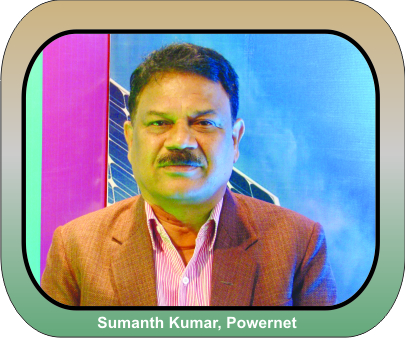 issue. Indigenously designed Off-grid
&
grid-sharing SPCU of medium to higher capacity has huge scope both in
India as well as upcountry. issue. Indigenously designed Off-grid
&
grid-sharing SPCU of medium to higher capacity has huge scope both in
India as well as upcountry.
According
to Mr. Sumanth Kumar Managing Director, Powernet Systems., Bangalore,
believes that âIn the past year the net materials cost of all the
products gone up and we are taking all cost cutting measures to control
the pricing and offer great value to customers.â We are doing reverse
engineering and research to check all the possibilities to reduce cost
without compromising on quality, he laments. flow going, some people
started quoting very low. But surely they can not repeat and sustain but
certainly some of listed companies could do it for long time. That is to
play a different game to keep the share price high. Even they have to
revert back at some point of time. We are focusing on diversified market
segment like solar PCUs and closely working with few OEM buyers in that
segment and working on new design to reduce cost of production and
support small time OEM buyers.
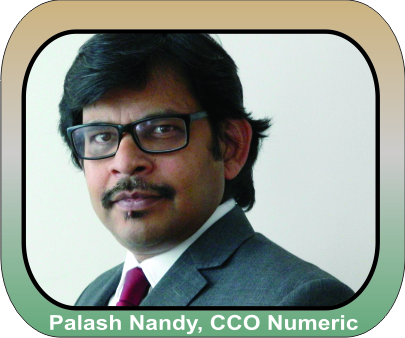 Mr.
Palash Nandy has 27 years of rich experience in Sales, Marketing and
Strategic Planning at Legrand, Who joined the Legrand group in 1990 as a
Sales Trainee in Kolkata. Subsequently he has many positions in Sales
and Marketing in India. His last assignment before Numeric was at the
Group HQ in France as Group VP Strategic Planning. Effective July 2016
he has taken over as CCO of Numeric which is a group brand of Legrand.
According to him Softdisk is the oldest and largest circulated magazine
and it gives a wide range of information from latest product news to
in-depth articles on power electronic industry and its reviews &
forecasts. The publication has been conducting surveys in the various
segments of Power, Solar & IT Industry and coming up with SD
Awards.
These surveys provide an in-depth analysis of the some segments of the
Industry and users utilize it as one of their decision making tools and
also as a guide of the Industry. Mr.
Palash Nandy has 27 years of rich experience in Sales, Marketing and
Strategic Planning at Legrand, Who joined the Legrand group in 1990 as a
Sales Trainee in Kolkata. Subsequently he has many positions in Sales
and Marketing in India. His last assignment before Numeric was at the
Group HQ in France as Group VP Strategic Planning. Effective July 2016
he has taken over as CCO of Numeric which is a group brand of Legrand.
According to him Softdisk is the oldest and largest circulated magazine
and it gives a wide range of information from latest product news to
in-depth articles on power electronic industry and its reviews &
forecasts. The publication has been conducting surveys in the various
segments of Power, Solar & IT Industry and coming up with SD
Awards.
These surveys provide an in-depth analysis of the some segments of the
Industry and users utilize it as one of their decision making tools and
also as a guide of the Industry.
Softdisk believes that
being
a negligible contributor to the GDP, Power Electronic Industry does not
receive enough attention from the Govt., we believe the Govt. should
realize the importance of Power Continuity as it is the life line of
major GDP contributors. Softdisk has seen it all over the past two & a
half decades, more often then not some of the companies use a lot of
word jugglery in there promos, it must be the same thing which some one
else must be offering without making lot of noise and at a better price.
It is one area where customers need to be watchful. Softdisk believes
that if Manufacturers mad rush for sale will only decrease their profits
and ultimately lead to their collapse. So UPS business is not rosy and
bright but has still not lost its potential. |